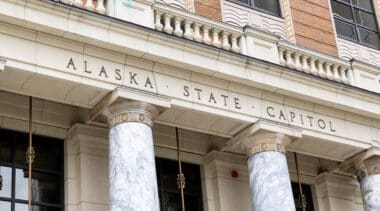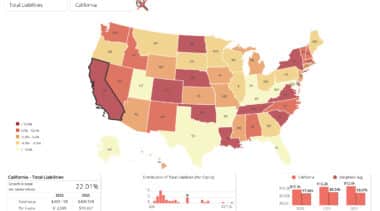Leonard Gilroy is vice president of government reform at Reason Foundation and senior managing director of Reason's Pension Integrity Project.
Under Gilroy's leadership, the Pension Integrity Project at Reason Foundation assists policymakers and other stakeholders in designing, analyzing and implementing public sector pension reforms. The project aims to promote solvent, sustainable retirement systems that provide retirement security for government workers while reducing taxpayer and pension system exposure to financial risk and reducing long-term costs for employers/taxpayers and employees. The project team provides education, reform policy options, and actuarial analysis for policymakers and stakeholders to help them design reform proposals that are practical and viable.
Gilroy and the Pension Integrity Project have provided technical assistance to several successful pension reform efforts in recent years in Michigan, Colorado, Arizona, South Carolina and other states aimed at tackling persistent pension solvency challenges.
In his role as vice president, Gilroy also leads Reason's government reform efforts, with over 18 years of experience researching fiscal management, government operations, infrastructure public-private partnerships, government contracting, and urban policy topics. He also regularly consults with federal, state and local officials on ways to improve government performance and efficiency.
Gilroy has a diversified background in policy research and implementation, with particular emphasis on competition, government efficiency, transparency, accountability, and government performance. Gilroy has testified before Congress on several occasions and has testified on pension reform before the Arizona, Florida, Michigan, and Texas legislatures. Gilroy works closely with state and local elected officials across the country in efforts to design and implement market-based policy approaches, improve government performance, enhance accountability in government programs, and reduce government spending.
Gilroy's articles have been featured in such leading publications as The Wall Street Journal, Los Angeles Times, New York Post, The Weekly Standard, Washington Times, Houston Chronicle, Atlanta Journal-Constitution, Arizona Republic, San Francisco Examiner, San Diego Union-Tribune, Philadelphia Inquirer, Sacramento Bee, and The Salt Lake Tribune. He has also appeared on CNN, Fox News Channel, Fox Business, CNBC, National Public Radio and other media outlets.
Prior to joining Reason, Gilroy was a senior planner at a Louisiana-based urban planning consulting firm. He also worked as a research assistant at the Virginia Center for Coal and Energy Research at Virginia Tech. Gilroy earned a B.A. and M.A. in Urban and Regional Planning from Virginia Tech.
-
House Bill 78 would expose Alaska to billions in additional costs
House Bill 78 could cost Alaska's taxpayers more than $7 billion in the coming decades.
-
Alaska’s defined contribution plan is a better benefit than a pension for most state public workers
State policymakers should keep the defined contribution plan open as an option for those who would like to take advantage of its inherent advantages.
-
Restoring the Florida Retirement System’s COLA would increase pension costs, risk
State policymakers should look beyond best-case scenarios when evaluating the restoration of a cost-of-living adjustment.
-
Proposed Model Policy: “Veterans Mental Health Innovations Act”
This model legislation is intended to authorize state ibogaine research and participation in a larger multistate effort to complete a supervised clinical drug trial.
-
Model legislation would authorize groundbreaking research into ibogaine for mental health
Growing research has demonstrated the promise of ibogaine in treating a wide range of intractable conditions, which could benefit veterans.
-
Assembly Bill 1383 brings back major pension costs for California
The bill rolls back crucial elements of the landmark PEPRA reform, which would result in billions in extra costs imposed upon California taxpayers.
-
Ibogaine offers major promise in treating addiction, mental health
Ibogaine has the potential to transform the lives of millions of Americans struggling with addiction and mental health challenges.
-
New Mexico Senate Bill 219 would regulate medical psilocybin access
The Medical Psilocybin Act would create a regulated system to allow patients with qualifying conditions to access and use psilocybin.
-
Arizona Senate Bill 1365 threatens higher taxpayer costs and pension risks
Arizona Public Safety Personnel Retirement System Tier 3 reform is working. Senate Bill 1365 would fundamentally alter the current system.
-
Legalizing psilocybin access in Arizona would benefit mental health
Arizona Senate Bill 1555 would create a regulatory framework for limited, legal access to therapeutic psilocybin services.
-
Debt trends for state and local governments 2020-2022
This tool provides debt and spending insights for the 100 largest municipalities, counties and school districts in America and all 50 states for fiscal years 2020, 2021 and 2022.
-
Psychedelic drug policy recommendations for the incoming Trump administration
The incoming Trump administration has promised sweeping reforms, and that might include reversing the federal suppression of psychedelics.
-
The case for Connecticut’s fiscal guardrails
The “fiscal guardrails” have saved Connecticut more than $170 million and could save $7 billion over the next 25 years.
-
Georgia’s teacher pension system needs reforms to address current debt, future risks
The pension plan is still $27.7 billion short on the assets needed to pay for retirement promises made to teachers.
-
Delaying Mississippi PERS reform will increase cost to taxpayers
PERS faces a $25.5 billion shortfall largely due to unfunded benefit increases, investment underperformance, and insufficient employer contributions.
-
Regulated psilocybin access in Arizona would help treat mental health conditions
Arizona Senate Bill 1570 would create a regulated and limited program to access psilocybin.
-
Senate Bill 88 would expose Alaska to significant additional costs
This bill could realistically add $9.6 billion in additional costs to future state budgets and reintroduce Alaska to significant pension risk.
-
House Bill 2854 threatens Oklahoma’s pension progress
House Bill 2854 would re-expose Oklahoma to unnecessary unfunded liabilities, financial risks, and hidden costs that would ultimately be borne by taxpayers.


















